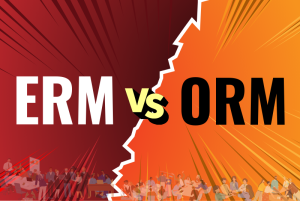All organisations apply risk management in some form, although it may not be in a structured manner. What ERM does is provide a structured format for its implementation. ERM frameworks are particularly helpful when it comes to decision-making, taking internal and external factors into account and fostering a risk-informed perspective. Risk identification, risk quantification, risk management and monitoring are all ERM tools for integration into decision-making. How should Boards utilise this to optimise risk-reward and drive business sustainability?
The word “risk” carries negative connotations, but risk does not always have negative results. The major challenge with regard to recognising opportunity in risk lies in being able to identify and manipulate the upside of the risks. The role of ERM is not to minimise risk; its role is to optimise risks and rewards. Risk is managed so that organisations can grasp the opportunity, and ERM is applied to help them do this. To seize opportunities, risk must be properly identified and managed before being appropriately manipulated to access the opportunity within.
In today’s business environment, where nothing can be accurately predicted, no one really knows what to anticipate. However, organisations should not let disruption and uncertainty constrain them from moving forward. From the outset, companies need to determine what they want to achieve, whether it is just to comply with regulations, or go beyond. Boards need to ensure that the organisation has the agility to pivot and help management think about what the next steps should be, to optimise risk-reward for the organisation.
ERM should ideally be embedded in organisational processes to strengthen the company as this supports risk-informed decision-making that creates value for the firm. In leveraging ERM as a strategic decision-making and planning tool for risk-reward, organisations should determine what main risk and opportunity events could affect the achievement of their business objectives, and how much impact these could have on their expected performance. Risk management processes help open the organisation’s eyes to possible risks in the future, thereby reducing surprises and vulnerabilities.
Organisations which successfully identify and leverage risk-reward opportunities to create value for themselves usually have systems which identify, manage, measure and monitor both risks and opportunities. Detailing the risk and opportunity management process actually builds on the risk management process by including tools and methods that can improve decision-making. Boards and management can integrate it into the process of constant assessment of the purpose and value proposition of the organisation.
Board members, given their maturity, will have extensive experience; their collective knowledge and leadership capacity will be invaluable. These may be further augmented by ERM processes that support and strengthen decision-making. One way for the Board to increase its collective knowledge and leadership capacity is to be diverse, as diverse Boards can access a wider range of perspectives, experiences and skills that are crucial to planning. Organisational understanding of ERM and leveraging it for risk-reward can also be achieved through proper training, qualification and mentoring.
ERM needs continuous professional education; it helps organisations anticipate and adapt to resources and conditions. Risk management is also about the psychology of risk, how people react to it, and how to deal with risk to drive performance. A thorough understanding of it in relation to the company’s situation, its policies, processes and strategies, will support the decision-making process, and drive organisational acceptance, thereby increasing the firm’s ability to optimise risk-reward as it utilises the framework and tools of ERM.





























